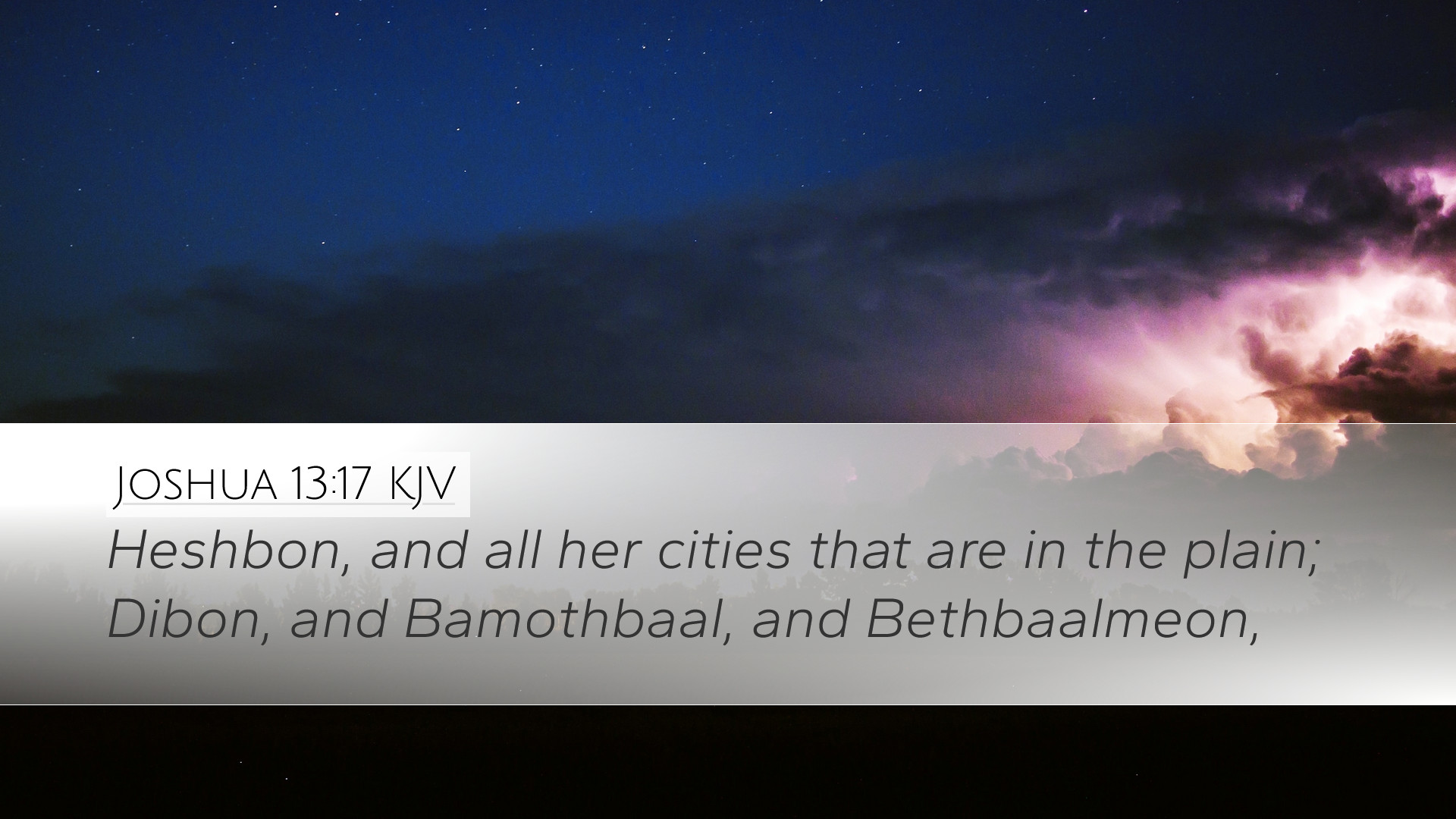Bible Commentary on Joshua 13:17
Verse Text: "And Heshbon, and all her cities that are in the plain, and all Gilead, and all Bashan, which was called the land of giants."
Introduction
This verse is part of a larger narrative where Joshua, the leader of the Israelites, is receiving instructions from God regarding the distribution of the Promised Land. In this passage, specific territories are mentioned, which holds theological and historical significance for understanding the fulfillment of God's promises to His people.
Historical Context
Joshua 13 marks a transitional moment where the land's division is emphasized. The mention of Heshbon and its cities indicates the importance of this region in ancient Israelite history. The account illustrates the geographical and political landscape after the conquests of Moses. Heshbon was formerly the capital of the Amorites, and its conquest by the Israelites symbolizes the victory of God’s people over their enemies.
Commentary Insights
-
Matthew Henry’s Commentary
Matthew Henry highlights that the name "Heshbon" signifies "thinking" and emphasizes the place's significance in the Israelite campaign. He notes that this city was a strategic point in the region, affirming the importance of location in the divine plan. The “plain” alludes to the fertile areas suitable for agriculture, manifesting God's provision for His people.
-
Albert Barnes’ Notes
Barnes outlines that "Gilead" represented a territory rich in resources, especially in livestock. This verse serves not only as an account of land division but also reflects God's promise through past covenants. Barnes notes the phrase "land of giants" signifies the inhabitants' formidable strength, which created fear. Yet, their defeat showcased God's might, encouraging the Israelites and challenging them to trust in God's continuing provision.
-
Adam Clarke’s Commentary
Clarke emphasizes the mention of "Bashan," also known as the land of giants, representing not just physical giants but spiritual opposition against God’s people. He elaborates on the historical context of Bashan as a stronghold for the Rephaim, noting the necessity for the Israelites to remember their victory over such adversities on their path to establishing a lasting legacy. Clarke calls attention to how these territories signify God's faithfulness to His promises stretched across generations.
Theological Themes
The theological implications of Joshua 13:17 extend beyond historical recounting. There are several important themes present in this verse:
-
God’s Faithfulness
This passage epitomizes God's unwavering fidelity to His covenant with Israel. The allocation of land serves as physical evidence of God's promises coming to fruition in the lives of the Israelites.
-
Victory over Adversity
Despite the formidable foes in the land, the narrative encourages believers today to rely on God’s strength in facing their challenges. The giants symbolize any spiritual or personal adversities believers encounter.
-
Community and Identity
The delineation of tribes and their respective inheritances provides a framework for community identity among the Israelites. This organization serves as a precursor to understanding the church as a body working together under Christ.
Application for Today
For pastors, students, theologians, and Bible scholars, this verse and its commentary invite reflection on God's active role in fulfilling His promises. It calls for an exploration of how these lessons apply in contemporary contexts:
-
Faith in God’s Promises
Believers are encouraged to foster a profound faith in God's promises amid challenging circumstances, recognizing that God remains steadfast and powerful.
-
Understanding Spiritual Warfare
The imagery of giants conveys the reality of spiritual warfare. Christians are called to equip themselves with knowledge from Scripture, just as Israel had to confront and conquer their adversaries.
-
Building Community
The organized distribution of land reminds believers of the importance of community within the body of Christ. Each believer has a role to play, contributing to the ministry through their unique gifts and callings.
Conclusion
Joshua 13:17 serves as an essential text within the broader narrative of Israel's conquests and inheritance. By examining historical context and theological significance while drawing from esteemed commentaries, we gain a holistic understanding relevant to the faith journey of contemporary believers. This passage encourages reliance on God's faithfulness and the power of community as essential components for fulfilling God's purposes in the world.


